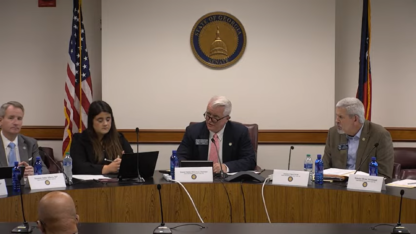Lawmakers Hope Open Records Bill Will Help UGA, Sports Programs

Alabama defensive coordinator Kirby Smart listens to a question from a reporter during a press conference where he was introduced as Georgia’s new head football coach Monday, Dec. 7, 2015, in Athens, Ga. Smart will stay with the Crimson Tide through the NCAA college playoffs. (AP Photo/John Bazemore)
John Bazemore / Associated Press
The new hire from rival University of Alabama has raised questions about UGA’s relatively strict drug policy, and he has already restricted student transfers to the competition.
It’s all part of an effort to put the Bulldogs on top.
State lawmakers are also eager to help UGA finally win a national championship. To get there, they passed a bill restricting open records access for journalists and the public.
Matt Brown, a writer with the sports blog SB Nation, and his colleagues regularly file open records requests with college athletics programs around the country, and he said that’s helped uncover inequity and potential mismanagement.
One example he gives: the University of Texas athletic department, one of the wealthiest in the country.
“Texas had taken a relatively unprecedented move and started charging their coaching staff to eat in the dorms with their student athletes,” Brown said.
The athletic director was trying to cut costs, he explained. It wasn’t a big deal to football coaches, who can be paid hundreds of thousands, if not millions, of dollars a year. But for a tennis coach, Brown said, who isn’t making that much, it showed why the athletic director didn’t care about your program.
The headline read: Texas brought in $161 million last year. It’s taking away free lunches for coaches to save $300K.
Brown said SB Nation’s story led to real changes last year.
“That I think helped crystallize a lot of the frustration with that athletic department, and a lot of those stories ultimately were part of why Texas made a leadership change in that position,” he said.
Brown said a bill that passed the Georgia Legislature would keep him from doing the same kind of reporting here. It gives college athletic departments 90 days to respond to open records requests.
As lawmakers were rushing to pass bills on the second-to-last day of the legislative session, Republican state Rep. Earl Ehrhart explained a proposed amendment on the House floor.
“It just allows for appropriate time frame with respect to our athletic associations to respond to open records requests,” he said.
The amendment quickly passed the Legislature, after Ehrhart explained it would protect recruits and recruiting information.
“Just allows us to play on the same field as Alabama and everybody else,” he said.
But Frank LoMonte, executive director of the Student Press Law Center, disagrees.
“We’re not aware of any kind of carve out like this existing in any other state’s law,” LoMonte said.
Rival state Alabama requires that athletic departments respond to open records requests in a reasonable amount of time.
The proposed Georgia law would go further, LoMonte said.
“In no case would any university be able to justify 90 days as being a reasonable amount of time to respond,” he said.
So where did Georgia lawmakers get the idea?
When Smart visited the Capitol a few weeks ago, he was introduced by his former UGA roommate, Republican state Rep. Trey Rhodes.
Rhodes let Smart know the state was happy to have him back from Alabama.
“We finally rescued him a couple of months ago, and, in my opinion, Kirby is at the pearly gates of college football. Ladies and gentleman, Kirby Smart!” said Rhodes, and the House of Representatives rose to welcome Smart.
Smart took photos with legislators during his visit, including with Ehrhart, but Smart denies he’s behind potential changes to the law.
“When I went over to the Capitol, I was asked what’s the difference in our program and some programs I’ve been at in the past,” he said in response to a question about the potential change to Georgia’s open records law for athletic departments.
The difference, Georgia’s current open records law requires athletic departments respond in three business days. There’s no leeway here, like in Alabama.
“It’s one of the things I brought up; there’s a difference,” Smart said. “That was the extent of my conversation with those guys about that. So for me to get the credit about that is a little bit misleading.”
The night the Senate passed the bill, Gov. Casey Cagle was quick to voice his support for the measure.
“I hope it brings us a national championship. That’s what I hope,” he said.
Soon after Ehrhart’s legislation passed at the Capitol, he denied he’d heard from Smart, or any other coach, about extending the response deadline to 90 days.
“Never talked to anybody, just something my colleagues and I had heard about, and we just did it,” Ehrhart said.
The bill now awaits the signature of Gov. Nathan Deal.








